by Jim Bottorff
Steve Glickman may understand the enormity of last month’s USA hockey accomplishment better than anyone. Glickman is an Illinois hockey hall-of-famer, a three-time state champion coach, and has been the Skokie Park District’s hockey director for the better part of three decades. But perhaps most importantly, he is a former high school goalie, who at age 17, received an invitation and tried out for the legendary 1980 USA Olympic Hockey team.
That memorable connection to America’s most celebrated sports moment set the stage for Glickman’s role in what would later affectionately be called by those who experienced it, the “Schmiracle on Ice.”
The amazing hockey story began in the spring of 2012, with Glickman assigned to an assistant coaching position on the USA hockey team, set to play in Israel’s 2013 Maccabiah Games, also fondly referred to as the Jewish Olympics. Maccabiah, sanctioned by the International Olympic Committee, is one of the three largest sporting events in the world, in 2013 hosting more than 10,000 Jewish athletes from 75 countries in 42 sports, with the opening ceremonies held in Jerusalem’s mammoth professional soccer stadium.
When Glickman arrived at the U.S. tryouts in August of 2012, he was reassigned from his job as assistant coach of the 'open' team (ages 18-39) to head coach of the 40-and-over masters team. Initially elated, the reality of the challenge ahead of him would not sink in until several weeks later.
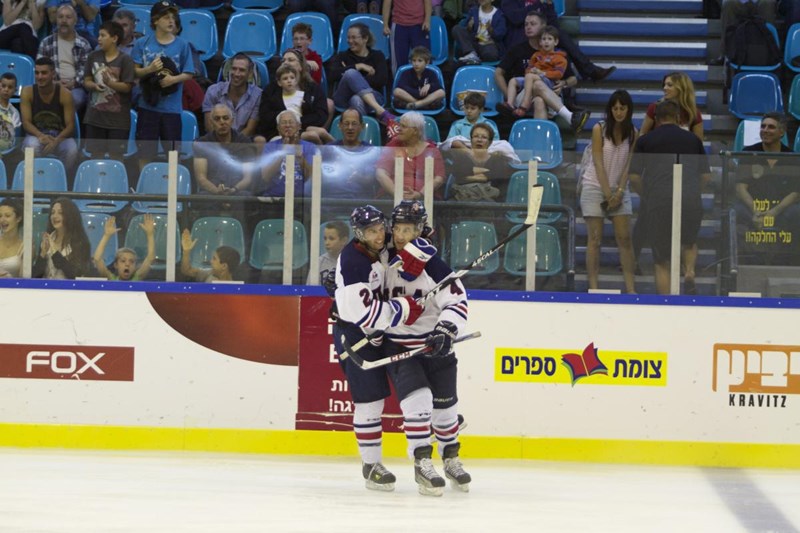
“We found only five guys at that first tryout,” he said, “so we spent the next seven months on conference calls – not just looking for top players – but for talented Jewish players over 40 that still regularly played the game. Early on I wasn’t sure whether we would actually be able to field a team."
After Glickman and his staff spent months looking for players, by March 2013, a squad was finally beginning to take shape. Among the players were former college stars Todd Lewis and Rob Goldstein, as well as Mike Goldberg, Mike Orzoff, and Notre Dame’s Billy Lerman.
The team gathered in March in Philadelphia, adding another 10 players at a tryout, including 52-year-old goalie Bruce Marks. In April, Team USA played an exhibition right after a Flyers-Rangers game at the 20,000-seat Wells Fargo Center. More practice games followed through June, with the team finally filling their 20-man roster. They finished their preseason schedule with a disappointing 1-6 record, admittedly playing against more than a few players younger than 40.
“It was encouraging that we were able to finally find players, some with college and a bit of pro experience on their resumes,” said Glickman. “But with what I was hearing about our Maccabiah competition, our warm up games were not exactly awe inspiring.”
The Games, set for mid-July, also featured hockey teams from Israel, Russia and Canada. The Russian team, USA hockey officials learned after arriving at the games, were not only partially-funded by the NHL, but were apparently not subject to an important roster requirement.
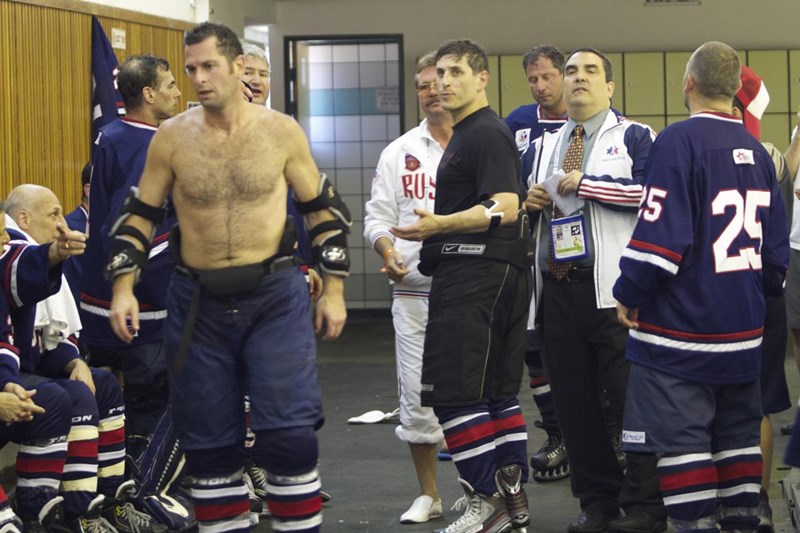
Several of their guys were walking around the hotel with crosses hanging around their necks,” Glickman said with a laugh. “I’m pretty sure that their coaches weren’t too concerned about them not being Jewish."
The Canadians were an even bigger obstacle. Not only had they been playing together for months, they were loaded with talent and led by NHL coaching legend Jacques Demers. In addition, Canadians around the country rallied around the team, as it geared up to take Canada’s national sport abroad.
Upon the ragtag Team USA’s arrival in Jerusalem on July 17, the squad gathered the next morning to practice 45 minutes from their hotel, at Metula’s Canada Centre, near the Lebanon border. Glickman, who worried about his players being on time that day, had himself set the wrong time on his watch and missed the team bus. When he jumped out of a cab just in time for practice after spending $110, his players knew he meant business.
“We had a great first practice,” he said.
The trip also came with a few – sometimes unexpected – profound spiritual moments for the players.
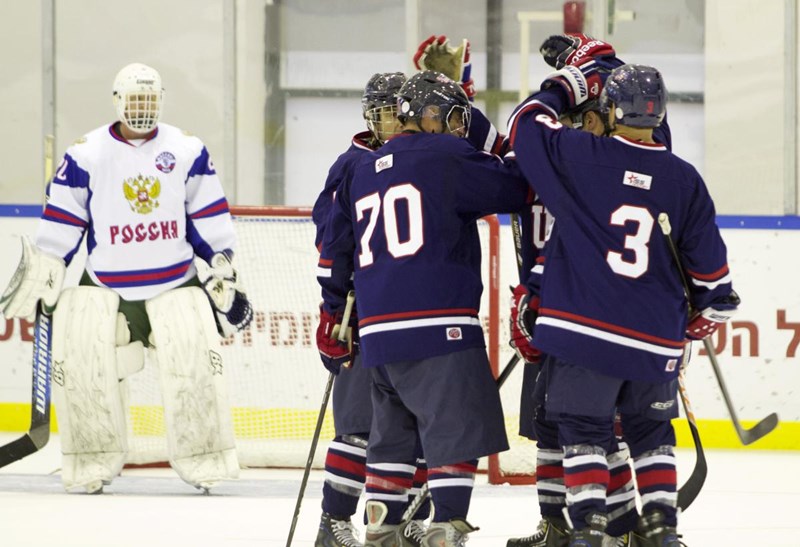
One of the last players chosen for the team was John Linder, a rabbi from Arizona. At 55, he was the oldest, and therefore perhaps the proudest member of the team – and was an all-hockey guy, all the time. However, at a Friday evening practice, he cut through the usual tough locker room talk, by spontaneously lighting candles and passing around wine in observance of Shabbat.
“Many of our players were not devout practicing Jews,” Glickman said, “yet, here we were in this holy place, everyone caught up in this solemn ritual. We felt very connected to each other from then on – as more than just hockey players. It was a powerful moment.”
On Sunday, July 21, Team USA finally took the ice, playing Canada in their first matchup in round robin play. The badly overmatched Americans, wearing replica 1980 Team USA hockey jerseys, gave the Canucks a decent game, losing only 6-5, to what Glickman called a “flat” Team Canada.
Next up on Monday was Russia. After several U.S. players arrived late for the team bus, Glickman asked them if they were “here to tour the country or to win a gold medal.” The Russians – led by star Igor Kaputsez’s six goals – proceeded to pound the Americans 11-6.
“They dominated us,” Glickman said.
And his words were even less kind for his team in the locker room after the game.
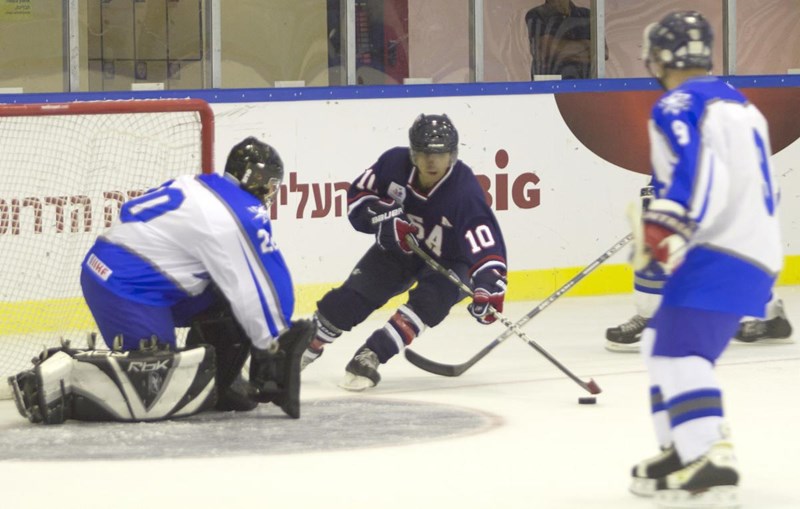
“This game was over before we even got off the bus,” he said.
The team finally got a win the next day, besting a scrappy Israeli team, 5-2.
With the medal round and Russia scheduled for the next day, Glickman knew that his team would have to neutralize Kaputsez if they were to have any chance of staying in the game.
“Our goalie, Bruce Marks, came up to me before the game and said ‘This game is on you, Steve.’"
Glickman knew what he meant. With a medal on the line, the coach would have to play his best players more, for the first time leaving some guys on the bench.
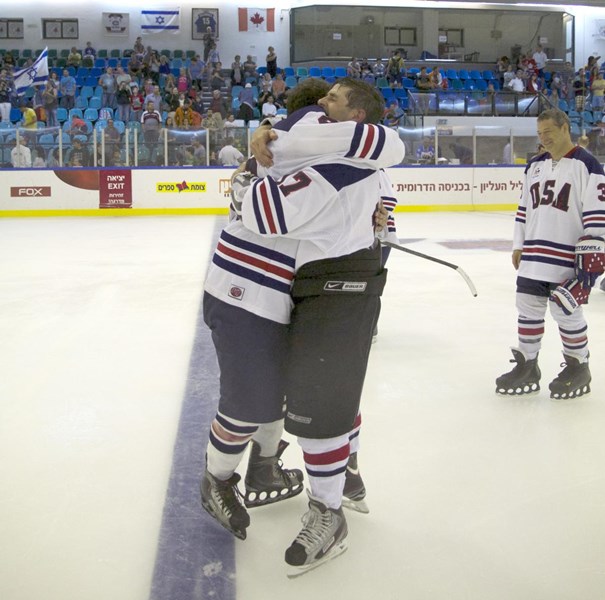
Team USA bolted to a 2-0 lead, then gave up three goals to go down 3-2. Still trailing with only two minutes left in the game, the Americans scored to tie it up, 5-5. Igor Kaputsez had been held scoreless and according to Glickman, the Russians were gassed. With 1:42 remaining, forward Garth Klimchuk, who had seen limited third period playing time, replaced a worn-out Billy Lerman, coming right off the bench to score on a rebound.
The Russians, still up a player on the power play, never pulled their goalie, which would have given them a two-man advantage in the waning seconds. The clock ran out and Team USA had pulled off an incredible 6-5 upset victory.
Like the 1980 Olympic team, Glickman’s club had overcome huge odds to defeat the Russians. However, unlike in 1980, the gold medal game would now pit the U.S. against the best over-40 team in the world, a 4-0 Canadian squad looking to avenge their razor thin win over the U.S. team four days earlier.
In preparation, Glickman stayed up half the night reviewing Canada’s four game score sheets. The next day, he and Jacques Demers, who had become fast friends that week, had no words for one another. And finally, the American coach, who had sported a casual red, white and blue warm up jacket and tie all week, showed up wearing a suit and a gold tie for the Thursday finale.
His team captain, Ira Schlussel, before giving a stirring pre-game speech, pointed at the coaches tie and declared to his team, “we’re ready!”
Unfortunately, so were the Canadians. Up 4-3 at the end of the second period, they would be returning to the ice in the third period with a one player advantage. Having to play the first 1:32 of the third period short-handed on fast ice, Glickman threw down the gauntlet in the locker room.
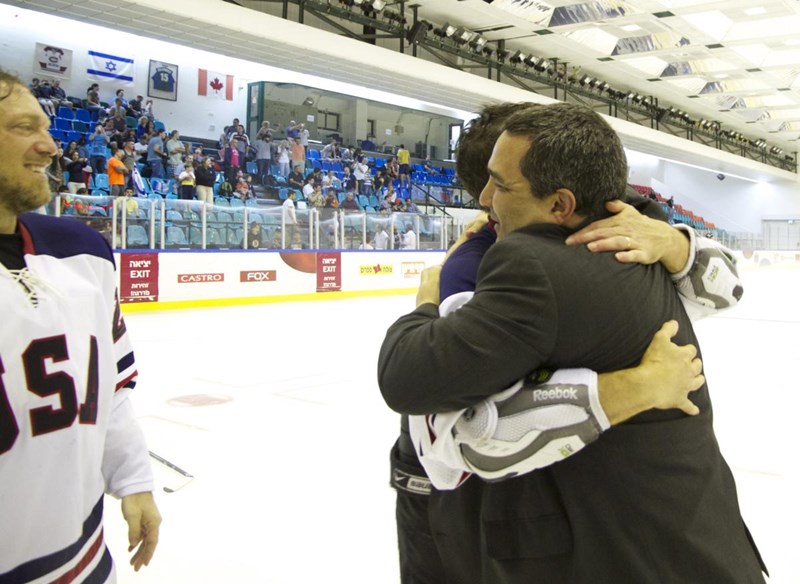 Coach Steve Glickman hugs his goalie Bruce Marks
Coach Steve Glickman hugs his goalie Bruce Marks
“If we kill this penalty off, we will win this game,” he said.
And incredibly, kill it they did.
Two minutes after the penalty kill, Team USA scored to tie the game, 4-4. Five minutes later, they scored a go-ahead goal making it 5-4. With about ten minutes left, they scored again. Finally, with about six minutes remaining and the favored Canadians beginning to crumble under the pressure, the Americans banged another one home, going up 7-4.
With under a minute left, a nervous coach Glickman refused to take his foot off the gas, leaving fatigued star Todd Lewis in the game to help ensure the win.
But Lewis was having none of it.
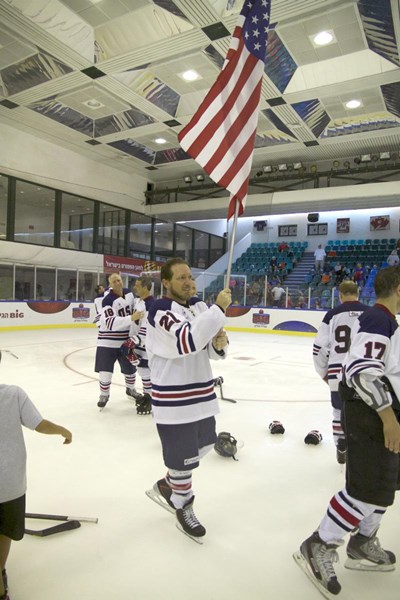
With 26 seconds remaining, he skated over to the bench and tapped his stick on Rabbi John Linder’s helmet. Stunned, Linder, who had seen no action in the medal round, was so excited he put his gloves on before fastening his chin strap. Quickly collecting himself, Linder vaulted over the wall, and was on the ice when the USA’s masters hockey team won the gold medal at the 2013 Macabbiah Games.
"I looked in the stands at the people waving the flag and I remember the feeling in the net of representing your country and all the hard work it took to get there, the accomplishment and sense of pride of being a Jew in Israel,'' said goalie Bruce Marks according to Fort Lauderdale’s Sun-Sentinel.
"We shocked everybody, and when we won, the fans stormed the ice,'' said left wing Pat Dray, also according to the South Florida newspaper.
And then, Glickman said with a smile, “we celebrated.”
That celebration saw most of his players hit the beaches and the bars of Tel Aviv the next day, before heading home. Glickman and Linder stayed another week touring Israel, and then marched in the Games’ closing ceremonies. Klimchuk, who scored the winning goal against the Russians, was so moved by his experience with Team USA in Israel, he officially converted to Judaism during his stay. (His mother is not Jewish.)
 And Steve Glickman, who has experienced countless triumphs in a lifetime of coaching and playing the game he loves, said, “It is the moment I am most proud of in my hockey career.”
And Steve Glickman, who has experienced countless triumphs in a lifetime of coaching and playing the game he loves, said, “It is the moment I am most proud of in my hockey career.”